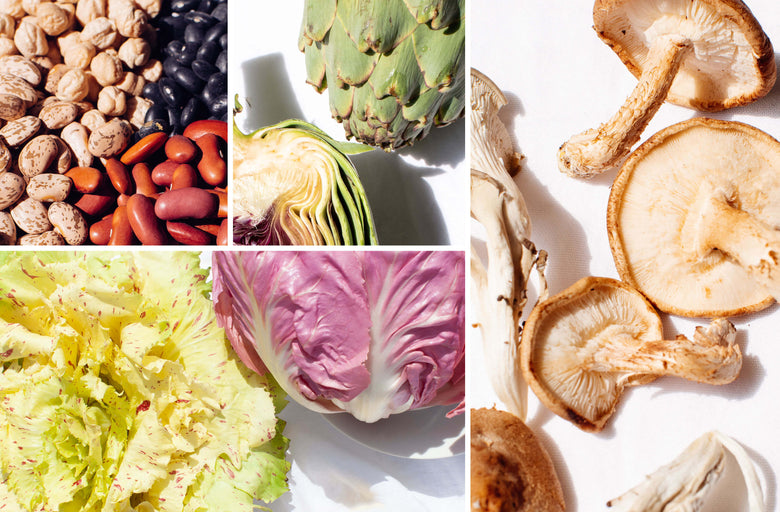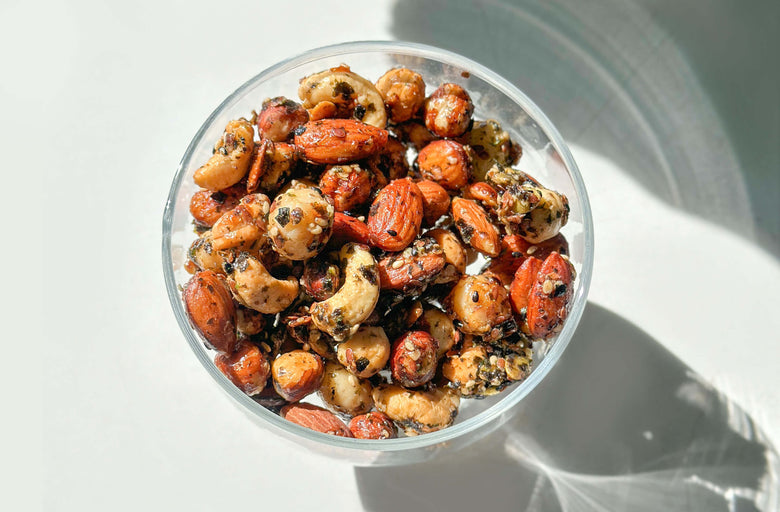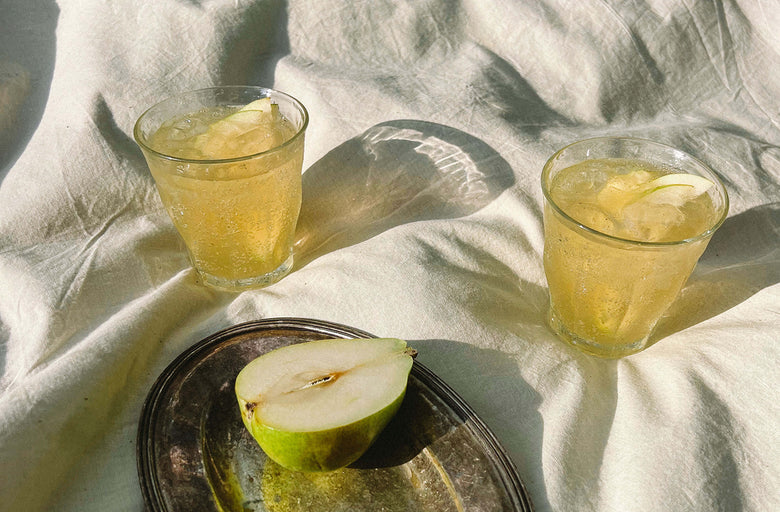The stress competition—who has a tighter deadline and fewer resources, who has the longest list of after-work social obligations, whose tangle of interpersonal dramas is more snarled—is intense these days. We're busy, we're over scheduled, and lessening the load isn’t often an option. To keep up with all this juggling, we're adding fuel to the fire in the form of caffeine.
To be clear, I’m not interested in living a less abundant life. I love ambition. I also love coffee. And science suggests a certain amount of stress is actually useful. What I’m seeking (and I don’t think I’m alone) is a way to channel that stress into productivity. I want to approach my busiest days with energy, clarity, and enthusiasm, minus the caffeine crash.
When Nootropics came onto the scene and started creating buzz, I was intrigued and wanted to learn more. The term nootropic was coined in 1972, by putting together 2 Greek words meaning “mind” and “bending.” This realm of cognitive enhancers are taken by Silicon Valley start-uppers hellbent on the next trillion-dollar idea, Bradley Cooper in Limitless, and now, me.
What I discovered was that Nootropics span many different substances—as tame as a double-shot espresso to as controversial as microdosing LSD—but the idea is there are supplements out there that can heighten focus, memory, and improve thinking. Nootropic Chocolates also contain adaptogens, Chinese and Ayurvedic herbs, and amino acids (the building blocks of proteins), that when combined, do more than just make you a star employee. Historically, these plants have been used to unleash creativity, reach a deeper state of consciousness, deliver you from a perpetual state of fight-or-flight, and provide you with that “on” feeling. All this, without any stimulant side effects. I asked esteemed TCM herbalist and acupuncturist (and Sakara founder Danielle DuBoise’s personal healer), Lida Ahmady of DeQi Health, to help me break down the key ingredients of Nootropic Chocolates before I took them on a test drive (keep reading for my full experience below.)
The Powers at Play:
L-Theanine: An amino acid known to impact the amygdala and hippocampus—the parts of the brain that rule our impulses for fear and anxiety. L-theanine increases alpha brain waves (which activate during meditation and deep relaxation) and can serve as a strong natural stress reliever.
Gotu Kola: This herb got its nickname, "the fountain of life," from a Chinese legend of a man who lived to 200 by taking it daily. Also used frequently by monks in the Himalayas to enhance meditation, this auspicious plant is used for alertness, focus, and memory. “Typically herbs or substances that can achieve such feats are highly stimulating,” says Lida. ”However, gotu kola is centering, which makes it ideal for anyone looking for a cognitive boost without any unwanted and imbalancing sides effects of stimulants.”
Lion’s Mane: Once reserved for royalty, this medicinal mushroom has been used for centuries for mental clarity. Now, we know its compounds help stimulate the Nerve Growth Factor, which is key for neuron growth, maintenance and survival. Lida explains that the compounds in Lion's Mane are neuroprotective, because they have the capacity to repair, regenerate and boost the nervous system overall. "[These compounds] increase cognitive activity and focus, and help reduce fatigue, anxiety and depression," she says, noting that lion's mane in particular is good for digestion, sleep, immunity and "general vigor."
Green Tea Extract: When paired with L-theanine, the caffeine in green tea energizes the body without the jittery crash normally associated with, say, an oat milk latte. Nootropic Chocolates include 50mg of caffeine, the equivalent of less than one cup of matcha. In an interesting study conducted in 2014, participants who underwent an MRI after consuming green tea extract exhibited an increase in activity in the regions of the brain associated with short-term memory and task performance. In real life, this translates to tackling your to-do list efficiently and being sharper and more engaged in meetings.
Bacopa Leaf: Recently dubbed nature’s ADHD treatment, this is an adaptogen which promises to keep stress levels in check through hormone balance. Research has explored its powers to ease anxiety, guard against chronic stress (and the inflammation that comes with), and even prevent dementia. Lida explains that adaptogens aren’t a quick fix. Instead, they work cumulatively to build back up your life force (or qi), which diminishes over time, causing energy blockages throughout the system. What does that feel like? “The body feels sluggish, the mind foggy and the spirit irritable and overwhelmed,” she says. Perhaps you’re familiar?
My Experience:
Let’s set the scene: I am a devout acupuncture evangelist. My coworkers can attest to my herbal consumption based on the various loose-leaf plants and powders scattered on my desk at any given time. Needless to say, I drink the high-vibrational, organic, herbal Kool-Aid.
But this winter has been merciless. It's been so dark for so long, and particularly taxing since I hail from the desert, where sunshine is my way of life. I’ve been leaning into coffees most mornings to keep my energy up, which for me is not a solid long-term plan on account of its effects on my adrenals, digestion, thyroid, and hormones. And the cold, early-onset night has me skipping workouts and declining social plans in favor of my warm bed.
So I committed to try a new solution to my winter woes. For a solid five-day work week, I bypassed the lines for lattes and Americanos and beelined into work, no beverage in hand. I experimented taking the chocolates in the morning, but I mainly used them as a means to ignore the 2PM slump and its siren song to grab a coffee. After that, I enjoyed a few laps around Soho to breathe some fresh air, have some quiet time, and took in some Vitamin-D before returning to the office and the blue light of my computer screen.
Within 30 minutes, I felt a noticeable shift. My energy was buzzy without being anxious—none of that antsy feeling in meetings, worrying about my ever-growing to-do list. Instead of dragging through the day, I floated. My appetite, often thrown out of whack by caffeine, remained normal. Best of all, I was able to access that elusive “on” feeling—invaluable to a creative person—in the middle of the day. By Tuesday evening, I honest-to-goodness felt inspired to go meet a friend on the Upper East Side for an 8:30pm dance class. On another night that week, I practiced a few guided meditations and journal exercises that I normally resist due to exhaustion. But this time, I felt compelled to express. The energy carried me through my full days, but didn’t keep me up at night. I simply felt a greater presence of mind when awake.
The Takeaway
This herbal chocolate gave me a zing. It woke up my body, helped me stay focused, sparked creativity, and allowed me to fill my days without leaving me depleted. My belief in the power of plants to stave off stress and create mindfulness was reinforced. I did not experience a crash, I didn’t feel like my digestion was hindered by these herbs the way coffee has a tendency to, and I genuinely felt my imaginative juices flowing with the need to create, write, and do. I'll be actively incorporating this sweet, energizing supplement into my work routine. It feels like a wise choice to ignite my mind, body, and spirit.
Food Transforms:
Metabolism Powder vs Mother Nature






